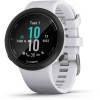Garmin Swim 2 Owners Manual - Page 19
Tips for Existing Garmin Connect Users
 |
View all Garmin Swim 2 manuals
Add to My Manuals
Save this manual to your list of manuals |
Page 19 highlights
1 Hold LIGHT for 15 seconds. The device turns off. 2 Hold LIGHT for one second to turn on the device. Resetting All Default Settings NOTE: This deletes all user-entered information and activity history. 1 From the watch face, hold UP. 2 Select > System > Reset. 3 Select an option: • To reset all of the device settings to the factory default values and save all activity information, select Reset Settings. • To delete all activities from your history, select Delete All. My device is in the wrong language 1 From the watch face, hold UP. 2 Scroll down to the second-to-last item in the list, and select it. 3 Select the first item in the list. 4 Select your language. Is my smartphone compatible with my device? The Garmin Swim 2 device is compatible with smartphones using Bluetooth wireless technology. Go to www.garmin.com/ble for compatibility information. My phone will not connect to the device If your phone will not connect to the device, you can try these tips. • Turn off your smartphone and your device, and turn them back on again. • Enable Bluetooth technology on your smartphone. • Update the Garmin Connect app to the latest version. • Remove your device from the Garmin Connect app and theBluetooth settings on your smartphone to retry the pairing process. • If you bought a new smartphone, remove your device from the Garmin Connect app on the smartphone you intend to stop using. • Bring your smartphone within 10 m (33 ft.) of the device. • On your smartphone, open the Garmin Connect app, select or , and select Garmin Devices > Add Device to enter pairing mode. • On your device, select UP > > Phone > Pair Phone. Can I use the cardio activity outdoors? You can use the cardio activity and turn on GPS for outdoor use. 1 Select START > Cardio > Options > GPS. 2 Select an option. 3 Go outside, and wait while the device locates satellites. 4 Select START to start the activity timer. GPS stays on for the selected activity until you turn it off. Tips for Existing Garmin Connect Users 1 From the Garmin Connect app, select or . 2 Select Garmin Devices > Add Device. Maximizing Battery Life You can do several things to extend the life of the battery. • Reduce the backlight timeout (Changing the Backlight Settings, page 12). • Turn off Bluetooth wireless technology when you are not using connected features (Turning Off the Bluetooth Smartphone Connection, page 6). • Turn off activity tracking (Activity Tracking Settings, page 11). • Use a watch face that is not updated every second. For example, use a watch face without a second hand (Customizing the Watch Face, page 11). • Limit the smartphone notifications the device displays (Managing Notifications, page 6). • Stop broadcasting heart rate data to paired Garmin devices (Broadcasting Heart Rate Data to Garmin Devices, page 7). • Turn off wrist-based heart rate monitoring (Turning Off the Wrist-based Heart Rate Monitor, page 7). NOTE: Wrist-based heart rate monitoring is used to calculate vigorous intensity minutes and calories burned. Appendix Data Fields Some data fields require ANT+ accessories to display data. % Heart Rate Reserve: The percentage of heart rate reserve (maximum heart rate minus resting heart rate). Aerobic Training Effect: The impact of the current activity on your aerobic fitness level. Anaerobic Training Effect: The impact of the current activity on your anaerobic fitness level. Average Distance Per Stroke: Swimming. The average distance traveled per stroke during the current activity. Average HR: The average heart rate for the current activity. Average Pace: The average pace for the current activity. Average Speed: The average speed for the current activity. Average Stroke Rate: Swimming. The average number of strokes per minute (spm) during the current activity. Average Strokes Per Length: The average number of strokes per pool length during the current activity. Average Swolf: The average swolf score for the current activity. Your swolf score is the sum of the time for one length plus the number of strokes for that length (Swim Terminology, page 3). In open water swimming, 25 meters is used to calculate your swolf score. Avg. %HRR: The average percentage of heart rate reserve (maximum heart rate minus resting heart rate) for the current activity. Avg. HR %Max.: The average percentage of maximum heart rate for the current activity. Calories: The amount of total calories burned. Distance: The distance traveled for the current track or activity. Elapsed Time: The total time recorded. For example, if you start the timer and swim for 10 minutes, then stop the timer for 5 minutes, then start the timer and swim for 20 minutes, your elapsed time is 35 minutes. Heart Rate: Your heart rate in beats per minute (bpm). Your device must have wrist-based heart rate or be connected to a compatible heart rate monitor. HR %Max.: The percentage of maximum heart rate. HR Zone: The current range of your heart rate (1 to 5). The default zones are based on your user profile and maximum heart rate (220 minus your age). Appendix 15















